- Home
- Nichole Christoff
The Kill List Page 16
The Kill List Read online
Page 16
“What the hell’s that supposed to mean?”
“It means,” Kev said, “was Brooke Thorp with you?”
I blinked at him, stunned into silence.
“Great way to get back at your ex-husband, isn’t it? Grab his kid so he suffers before you have him killed.”
“That’s ridiculous!”
“Is it? Someone snatches his kid and you show up. Someone takes a pop at him and your guy is at the scene. Ten minutes later, you show up. Again.”
“Tim Thorp asked me to take this case.”
“Tim Thorp says you quit.”
“Then arrest me.”
In a flash, Kev was in my face. “What’s the missing link here, Jamie? Not that handyman, Foley. Not that soldier in Barrett’s lockup. You.”
“If I wanted Tim Thorp out of the picture,” I said, standing my ground, “I had plenty of opportunities. I was married to the guy.”
“Yeah,” Kev sneered. “Until he left you for Brandy the Blond Cocktail Waitress.”
For a moment, I couldn’t breathe. From far away, I heard myself say, “Who told you that?”
“It’s true, isn’t it?”
I ignored his question.
“I went to Philly for an arraignment.” My voice came out calm, but I was roiling inside. “You might’ve seen the outcome of my little trip on the news. I spent the entire day assisting in the hunt for a fugitive because the Philly PD asked me to.”
“That’s easy to check, Jamie.”
“Then you ought to be able to handle it.”
I spun on my heel, returned to the living room with my BlackBerry in my hand. With a flick of my thumb, I called up the file from Derrick Larkin’s flash drive I’d emailed to my phone. I found Tim fussing at the EMT who was attempting to bandage his cheek and the shallow channel a bullet had blazed there.
Brandy, still pale as death, tried to soothe her husband. Derrick Larkin had been allowed to join the party. He must’ve rushed to Tim’s side, judging by the pearls of sweat dotting his hairline. The rest of him was regulation perfect in his pressed Class A shirt and trousers. No sign of his black portfolio, though. He looked out of place among the agents in their windbreakers, the MPs in their ACUs, and Tim in his running shorts.
“Tim?” I looked up from the data on my phone. “When was the last time you heard from Mr. and Mrs. Richard Sykes?”
Crimson spots bloomed in Derrick’s high cheekbones. He knew where these names had come from and he wasn’t happy I was reading them out loud. Tim regarded me blankly. “Sykes?”
“How about David Voorhees? Has he emailed or phoned you at the office recently? Or worse—has he dropped in for a visit?”
I didn’t wait for his answer. One by one, I read some of the 256 names of the grieving loved ones compiled on the thumb drive Derrick had given me at the Last Stand. Tim recognized each and every name. I could tell by the way he drew himself up. And the way he cooled his tone down.
“Who gave you those names?”
I smiled, taking perverse pleasure in lying to the man who so often had lied to me. “You hired me to investigate. I investigated.”
“Jamie,” Kev’s voice had lost its petulance, “what’s this about?”
But I’d had enough of Special Agent Kevin Jaeger, FBI. I ignored him, spoke to Tim. “Which one of these people has been taking potshots at you? Which one has Brooke?”
“I don’t know,” Tim said softly.
And unless I missed my guess, his eyes were glassy with unshed tears.
I left Tim in his stark living room and marched outside to stand on his sidewalk, sucking in the chilly morning air. The breeze felt good on my overheated cheeks. But it didn’t do a thing for the raw wound burning in my heart.
I didn’t care that Kev had made the connection between my ruined marriage and Tim’s new, ready-made family; I cared that he’d thrown it in my face. Because I knew what my biggest failure was. And I knew—personally and professionally—that failure was never an option. My father had made sure I’d learned that lesson years ago.
“Jamie?” Pearce joined me. “What just happened in there?”
When I didn’t reply, he wrapped his arms around me, daring me to go on disregarding him while he pulled me into a bear hug. I couldn’t do it. But I couldn’t fall apart, either. Not here. Not now. Not with a stolen child still in danger. Or in front of so many people who’d love a ringside seat to my emotional meltdown.
I gave Pearce a quick squeeze and a manufactured smile.
“You can tell me all about it,” he said.
I slipped from his embrace, patted his shoulder. “I don’t need to. I’m fine.”
“You’re not fine. You’re upset. Tim’s upset, too. Jamie, who were those people you asked him about? How did you get their names?”
I shook my head. I couldn’t draw Pearce into this. “One of those people may have the answers we’ve been looking for.”
“Then you’ve got to tell Special Agent Jaeger. You’ve got to tell him right now!”
“Believe me. Now he knows. But he’ll follow protocol. He’ll assign an agent to check out those names. And that could take days.”
“Days? Brooke doesn’t have days.”
“Kev Jaeger won’t circumvent procedure. He won’t take a chance for Brooke’s sake. I will, Pearce. You’ve got to give me room and let me do it.”
Pearce nodded. A deep sadness made him look suddenly old. “My father was a stickler for procedure. He expected everyone around him to live by his rules. If you didn’t, you paid the price.”
“How high a price?”
But I got the feeling I didn’t want to know.
“ ‘Spare the rod, spoil the child,’ ” Pearce quoted. “My father said that all the time. He acted on it, too.”
Horrified, and hoping to comfort my friend, I slipped my hand through the crook of his arm. “I’m sorry that happened to you.”
“Well…” Pearce patted my paw as if he were the one doing the comforting. “It was easier for me than for my little cousin. When my aunt and uncle died in a plane crash, my parents took him in. He was twelve at the time. He never quite got into the swing of things.”
“Didn’t anyone notice? Didn’t someone call the cops?”
“My family has owned half of Boston since the Pilgrims landed on Plymouth Rock. People are afraid to look too closely at those who have that kind of money, Jamie. They’re afraid of those with that kind of power. You know that as well as I do.”
I wanted to disagree with Pearce. I wanted to tell him Justice was blind. I wanted to tell him someone should’ve helped him and it wasn’t right that they hadn’t. But right or not, as the daughter of a powerful father, I understood all too well what Pearce was saying. It was the reason I didn’t often fess up to being my father’s daughter.
Because of my father’s money, and because of my father’s power, others expected less of me. Sometimes, they expected more. And sometimes, some of them expected a lot more—like the people, places, and things his money and power could buy for them.
Pearce said, “My father literally had a stroke when I joined the army. As soon as he could hold a pen, he signed the papers to eliminate my trust fund. He thought I’d get out of the army after four years and have nothing to live on. He thought I’d come crawling back to him. I showed him, though. I took a chance, I got away from him, and I made a career of the military.”
“As a chaplain,” I realized, “to help others. And you’ve never looked back.”
“Oh, never say never.” Pearce snatched the hand I’d slid through his arm, lifted it high, and spun me as if I were a ballerina in a spotlight. “I’ve never gotten over my appreciation for handmade shoes, Jamie. The pair you’re wearing are exquisite.”
Then my chaplain smiled, and all the dark things we’d discussed seemed to fade away. “Taking chances can pay off, Jamie, but sometimes they take their toll. Call the chapel Monday morning. Make a counseling appointment. Come to see me
.”
“That’s not—”
“Come to me, Jamie. I can help.”
“I’m not a battle-scarred soldier, Pearce.”
“No, but not all scars are on the outside. I once knew this soldier who thought he heard angels. He grew dangerous to himself and others. He was damaged, Jamie, even if you couldn’t see it.”
He sounded a lot like Charles Chapman Brown. “What happened to that soldier?”
“Don’t worry about him. Let’s worry about you. You’re hurting. So, either you come to me or I’ll come to you. Where are you staying?”
Resigned, I told him Matty and I were at the Pines. “I promise I’ll call your office Monday.”
“Good girl.”
And this time, when Pearce hugged me, I hugged him back.
Chapter 23
Pearce left me to go where he was most needed—to comfort Brooke’s parents. I watched him walk away, discovered Barrett observing me from the carport. He joined me in the driveway.
“The names you read to Colonel Thorp,” he said. “They’re not from his Christmas card list, are they?”
“No, they’re not.”
And I wondered if one of those names belonged to someone who had the ability to waltz onto Fort Leeds at will. Such as someone retired from active duty or working on the post as a civilian employee. That someone could’ve shot at Tim—or even kidnapped Brooke. Unfortunately, my staff and I couldn’t compare the names Derrick had given me with that kind of information. Barrett, however, could.
“If I send you a list,” I asked him, “can you find out if one of the names belongs to someone with access to the post?”
“Where did these names come from?”
“First things first, Barrett. Can you do it?”
“Yes, ma’am.”
“Good.” I stepped off the curb and started toward my rental car. “I’ll text you.”
“Just a minute.”
Barrett didn’t seize my arm the way Kev had when he’d hauled me into the kitchen. He grasped my hand. Like a fairy-tale prince about to propose, Barrett didn’t let go.
“Jamie, those things Kev Jaeger said to you—”
“Kev’s a jackass.”
“No argument there. But Jaeger only loses it when you’re around. What’s the story between you two?”
I tried to slip from Barrett’s grasp. “People are looking at us.”
“Let them look.”
Actually, Barrett’s cops and Kev’s agents were too busy searching adjacent lawns, prowling through the bushes, poking in the storm drains, and interviewing Tim’s neighbors to pay any attention to a lieutenant colonel and a private investigator hand in hand in the driveway. All the same, I felt conspicuous. As if anyone could glance my way and see my pulse jumping at my wrist.
Because Barrett certainly made my pulse jump.
He took a step toward me and my heartbeat hammered all the way up my arm.
“Six months ago,” I said, opting to give Barrett an edited version of recent history, “Kev didn’t just get it wrong. He got it very wrong.”
I went on to tell Barrett about the Delmonico boys. About how I suspected their estranged father had snatched them. And how Kev had refused to go after him because of investigative protocol.
“They died, Barrett. Their father drowned them one by one in the Delaware River. I found their bodies.”
When the memory of it shivered through me, Barrett twined his fingers through mine.
And I didn’t mind a bit.
“That’s why Kev can’t stand to work with me. I was right and he wasn’t just wrong; he was dead wrong. Now I have to find Brooke despite Kev. I have to find her despite the rules.”
“Show me the names,” Barrett said.
In the shadow of Matty’s Bronco, I did. While Barrett thumbed through the long list I’d compiled on my BlackBerry, Matty kept his eye on his rearview mirror—angled to see everything going on at Tim’s. No doubt he’d seen me hemming and hawing with Pearce—and making a fool of myself in the driveway with Barrett.
Matty, however, spared us his opinion on that subject.
He said, “Got a question for you, girlie girl. How did this shooter know Thorp would go for a run first thing this morning?”
Matty, not surprisingly, had a point.
“He knew Tim’s route, too,” he added.
Tim could’ve left his doorstep to jog in a half dozen directions, including through the woods out back. My father and I used to run there all the time. Tim, however, had headed west along the post’s residential streets—and someone had known to lie in wait for him there.
“Well, at a glance, no one on this list is buddy-buddy with Thorp. None of them are his neighbors. None of them command units on the post,” Barrett said, returning my BlackBerry to me. “Send this to me. I’ll have my sergeant run the names against some DoD databases.”
As fast as my fingers would fly, I did. But if even one of the 256 names wasn’t legit, all the efforts of Barrett’s sergeant wouldn’t do us any good. Because a bogus name would be a dead end. It wouldn’t connect us to Tim’s shooter. And the gunman, under his real moniker, would still be able to come and go on Fort Leeds undetected.
But then something occurred to me. I’d spent a lot of time focused on the signatures tagging the hate mail. As a result, I’d glossed over the content.
With a quick eye, I read several of the messages again. This time, I searched out specifics like people, places, and things. And this time, I noticed a pattern.
To the Coward Colonel Tim Thorp, one father wrote. You think you’re safe, sitting on your candy ass in your comfy office while real soldiers get killed in Iraq. Well, I know what you did to put those soldiers in Hangar Six. My nineteen-year-old boy was one of them. I’m coming after you for what you did to him, and I’m bringing my shotgun with me…
Hey, Thorp, another read. Do you even give a rat’s ass about the men and women in Hangar Six? Where were you when they left bits and pieces of my cousin in there? Nowhere. I’m going to pay you back for what you’ve done. I’ve got a bullet with your name on it. I’ll stick my pistol in your mouth, I’ll pull the trigger, and then I’ll laugh as I piss on your dead corpse…
But as disturbing as those threats were, one in particular got under my skin for an entirely different reason.
Dear Colonel Thorp, a mother had written. I’m sure, in your position, all soldiers are alike to you. But I want to tell you about one soldier. I want to tell you about my son. My husband and I thought we’d never have children, so we were overjoyed when Robert came along. He was bright and kind and he could never leave an injured dog or bird to fend for itself. He had to help. That’s why he joined the army. He was going to marry his high school sweetheart this spring and study to become a veterinarian. Thanks to you, he arrived in Hangar Six on Tuesday. Yet, you didn’t even have the decency to go there…
“Look at this,” I said, brandishing my BlackBerry at Barrett. “Some of these threats say the same thing. They blame Tim for something that happened in Hangar Six.”
“Hangar Six?” Barrett asked.
I’d never heard of a Hangar Six on Fort Leeds. But I wouldn’t be surprised if one existed. The post was vast. And it was old. A ramshackle depot within the gates had once received World War I soldiers arriving directly by rail.
After the attack on Pearl Harbor, Fort Leeds had again become a point of debarkation for troops headed to battlefields overseas. During my father’s tenure as post commander, it still was. Even now, if I held still, I could hear the roar of jet engines in the distance ferrying troops and cargo between Fort Leeds and far-flung destinations.
“Maybe our shooter has a connection to Hangar Six. Where exactly is it and what goes on there?”
“I think,” Barrett told me, “you’d better see for yourself.”
—
Hangar Six wasn’t with the rest of the buildings on the Fort Leeds flight line. To reach it, Barrett drove me across the o
cean of concrete that served the post’s airlift operations. Stuck among a hodgepodge of structures, the hangar had seen its heyday during the last world war, but it was far from being out of service.
Jeeps and heavy trucks in that famous army green sat in its shadow, indicating something was certainly going on there. It had been designed to house a squadron of aircraft behind its massive, sliding doors. It had even been big enough to hide them from high-flying, Cold War spy planes.
We got out of Barrett’s pickup and started toward the hulking hangar. Its long wall loomed ahead of me like a cliff face, but set into the side of it was a battered door. I grasped the door handle, depressed the latch.
Fixtures high above my head and as remote as the stars poured a cold, white light over the largest cargo plane I’d ever seen. It rested in the center of a hangar the size of a football field, making the men around it look like some kid’s forgotten action figures. With all the spit and polish of an honor guard, four soldiers stood at attention at the foot of the plane’s loading ramp. Two bore rifles in their white-gloved hands. One carried the flag of the U.S. Army. The fourth bore the Stars and Stripes.
Somberly, all stood watch as more soldiers emerged from the belly of the plane. Eight men formed this company. And a ninth lay in the flag-draped box resting on their shoulders.
At that moment, a knot rose in my throat and threatened to strangle me.
I choked it down as the eight soldiers carried the casket down the ramp, past the honor guard, and out into the hangar.
Carefully, respectfully, slowly, they carried their fallen comrade across the cold concrete floor. Until they laid him to rest in a spot in the perfect grid crisscrossing the cement. A grid made of dozens of flag-draped coffins.
So many caskets.
So many soldiers.
Sadness swelled my heart and I looked at the soldier beside me, seemingly indestructible with his broad shoulders and his loaded sidearm. But I’d seen the crazy crescents where hot metal had sliced deep into his skin. I’d heard the story of the bomb blast he’d survived.
And of his colleague who’d tried to shoot him in the face.
Barrett—and soldiers like him—lived their lives a breath away from death because society and civility and sanity asked them to. And what did we give some of them in return? A one-way ticket to silent Hangar Six.

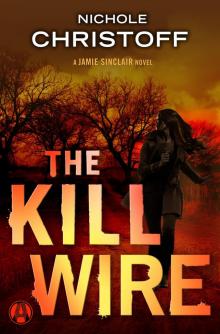 The Kill Wire
The Kill Wire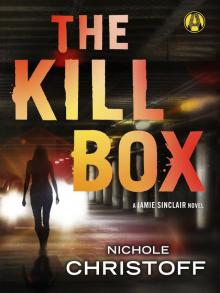 The Kill Box
The Kill Box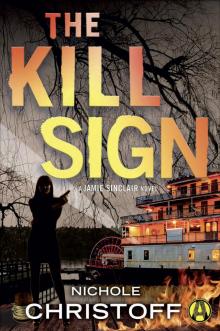 The Kill Radius
The Kill Radius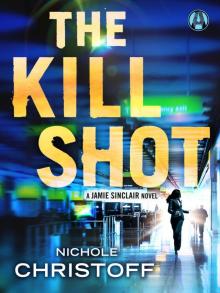 The Kill Shot
The Kill Shot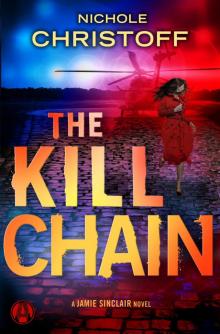 The Kill Chain
The Kill Chain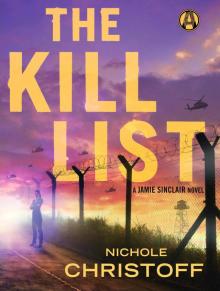 The Kill List
The Kill List